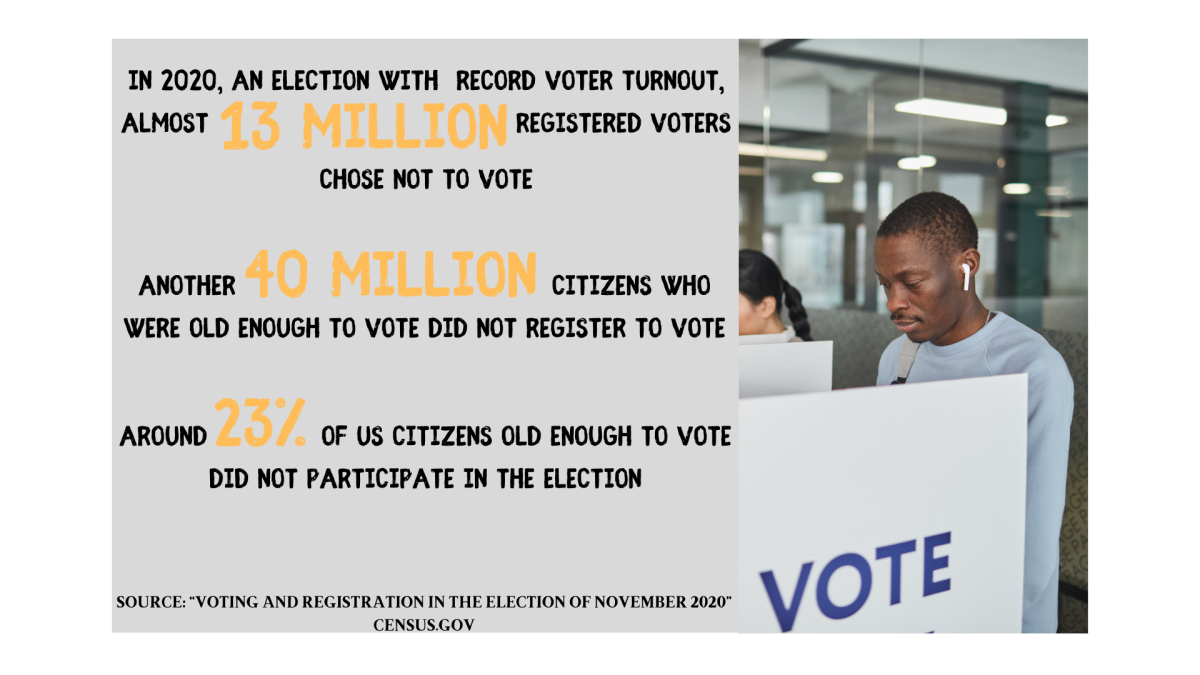*The opinions expressed within the content are solely the author’s and do not reflect the website’s or its affiliates’ opinions and beliefs.*
Since the dawn of time, the U.S. has strongly valued individual freedom to make decisions. As citizens in the U.S. can choose whether or not they want to cast a vote in presidential elections, voter turnout has remained relatively low compared to other countries. Additionally, according to the Pew Research Center, political efficacy ratings in the U.S. rank low on the global scale compared to other countries. To enhance these metrics and promote societal welfare, the government should strongly consider the adoption of mandatory voting.
By implementing mandatory voting, the government can ensure equity in various aspects of U.S. politics. First, the U.S. operates on democratic principles, in which government decisions ideally mirror the desires of the population. To ensure legislation aligns with the populace’s opinions, it is imperative for all citizens to participate in voting, preventing small factions from unduly influencing legislation to their advantage. Voting rights in the U.S. should not be contingent upon one’s race or financial status. Notably, certain demographics, such as young individuals and low-income minorities, participate in voting at significantly lower rates compared to other segments of the population. According to The Center for American Progress, almost half of the abstained voters are Hispanic, African American, or of another racial/ethnic minority. Because most of these minorities are less affluent, they often hold jobs with strenuous working hours that make it difficult for minorities to take time off from work. By implementing mandatory voting and supportive legislation, the U.S. can provide paid time off (PTO) specifically for low-income workers so that financial concerns will not prevent them from voting.
Additionally, mandatory voting can increase the education of society and the efficiency of politics. A large increase in the voting population means that more uneducated people will be participating in elections. In order for one to make an informed decision while voting, they will need to do research on all of the available candidates. This will improve the population’s ability to understand political goals and analyze which political candidates most strongly align with their core values. The influx of voters will also necessitate a more efficient voting system. Traditionally, voting requires one to be registered to vote and either mail in a ballot or show up in person at a polling booth. However, making voting mandatory can remove voter registration, which will remove an obstacle that may currently discourage one from voting. Additionally, the U.S. can allow for all mail-in ballots, as these will save citizens time and money spent on transportation. States that permit mail-in elections generally experience elevated voter turnout rates, underscoring the efficacy of such ballots.
While one may argue that unmotivated voters may select randomly on ballots, which can negatively affect election results, it is crucial to recognize that politicians will inevitably need to streamline their objectives to resonate with less motivated voters. This simplification process can lead to a reduction in unnecessary rants during political debates and enable politicians to steer clear of ambiguous and frequently misleading statements. By providing more comprehensive yet concise campaigning, unmotivated voters will feel more compelled to understand politicians’ motives and vote.
In conclusion, if the U.S. government aims to more accurately reflect the demands of its citizens, voting needs to be made mandatory. By doing this, more minorities will participate in politics. Compulsory voting can force U.S. citizens to become more educated as well, while the increase in the number of people voting ensures the implementation of a more efficient ballot system. Lastly, mandatory voting can assist politicians in prioritizing their goals and delivering more concise campaign speeches. Given the U.S.’s assertion of being a democracy, serious consideration should be given to implementing compulsory voting to foster a more participatory society.










